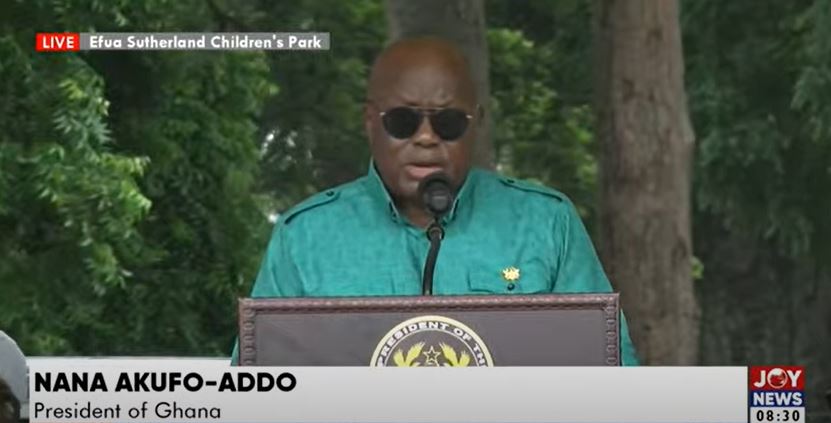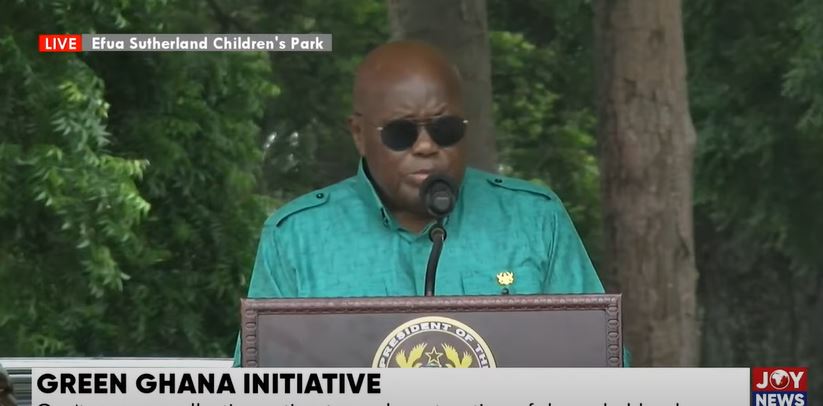Ghana is racing against time to win the war against climate change and food security, following a revelation that in the last 10 years, the country has lost 100,000 acres of forest cover.
The development is said to be responsible for the collapse of the timber industry, which has resulted in the loss of thousands of jobs.
Delivering his speech at a ceremony to mark this year’s Green Ghana day in Accra, President Akufo-Addo noted that the trend, if not halted, could increase food challenges in the country and affect the natural forest cover.
“Globally, some 1.6 billion people depend on the forest for their livelihoods; and in Ghana, some 85% of the population rely on forest resources for subsistence to satisfy their socio-cultural needs. Despite the importance to our existence, our forests are depleting at an alarming rate.
“Here in Ghana, we have lost some 100,000 acres of natural forest in the last decade alone. Our timber industry which generated jobs for thousands of people is suffering. The Odum, Wawa, Mahogany, Sapele and several other wood species of the timber industry are also depleting at an alarming rate,” he said on Friday, June 10.
He described as troubling a global data which suggests that the world is losing 79 million acres of rainforest every year.
“Some 80 years ago, half of the earth surface was covered by forest. Today, with an estimated forest area of 4 billion hectares, forest cover is less than 30% of the world’s surface.

“In the last three decades alone, the world has lost 1,037,846,602 acres of forests, more than 10% of the current total forest area,” he added.
Mr Akufo-Addo is hopeful the success of the Green Ghana initiative from last year will be a guide to safeguarding the trees to be planted this year.
Sector Minister
The Lands Minister, Samuel Abu Jinapor, in his remarks noted that the 2022 nationwide tree planting exercise will see 10 million of the 20 million trees being planted in forest reserves across the country.
The remaining 10 million will be planted outside the forest reserves, including boundaries, office compounds, sites within communities such as parks, roadsides, homes, churches, mosques, schools and other significant areas.
“Given the very ambitious nature of our target, we have had to mobilise 20 million seedlings, distribute them, get them planted and develop a framework to nurture them to maturity,” Mr Jinapor said.
Latest Stories
-
Joy FM listeners criticise Achiase Commanding Officer’s election comment
5 mins -
Legal Aid Commission employees threaten strike over poor working conditions
8 mins -
Ghana ranked 7th globally as biggest beneficiary of World Bank funding
18 mins -
IMF board to disburse $360m to Ghana in December after third review
22 mins -
Former Bono Regional NPP organiser donates 13 motorbikes to 12 constituencies
28 mins -
Securities industry: Assets under management estimated at GH¢81.7bn in quarter 3, 2024
33 mins -
Gold Fields Ghana Foundation challenges graduates to maximise benefits of community apprenticeship programme
2 hours -
GBC accuses Deputy Information Minister Sylvester Tetteh of demolishing its bungalow illegally
2 hours -
Boost for education as government commissions 80 projects
2 hours -
NAPO commissions library to honour Atta-Mills’ memory
3 hours -
OmniBSIC Bank champions health and wellness with thriving community walk
3 hours -
Kora Wearables unveils Neo: The Ultimate Smartwatch for Ghana’s tech-savvy and health-conscious users
3 hours -
NDC supports Dampare’s ‘no guns at polling stations’ directive
3 hours -
Police officer interdicted after video of assault goes viral
3 hours -
KNUST’s Prof. Reginald Annan named first African recipient of World Cancer Research Fund
3 hours

